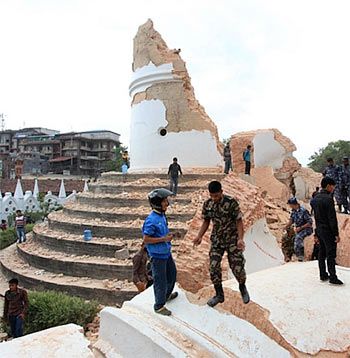 Nepal's macroeconomic performance has been held back by the earthquakes and the recent unrest and disruptions to transportation and trade routes following the promulgation of a new constitution, the IMF said has said.
Nepal's macroeconomic performance has been held back by the earthquakes and the recent unrest and disruptions to transportation and trade routes following the promulgation of a new constitution, the IMF said has said.
This was also resulted in deceleration of Nepal’s real GDP growth to 3.4 per cent in 2014/15 (mid-July 2014 to mid-July 2015) from 5.5 per cent in 2013/14, the IMF said at the conclusion of IMF Executive Board's concluded annual consultation with Nepal.
"The earthquakes in April and May and protests and trade disruptions following the promulgation of a new constitution in September have exacerbated the macroeconomic policy challenges facing the Nepalese economy," the IMF said, referring to the blockade of trade routes with India due to protests by Indian-origin Madhesis who are opposed to splitting the country in seven provinces.
"While macroeconomic management has been broadly satisfactory, Executive Directors noted that Nepal's macroeconomic performance has been held back by the earthquakes and the recent unrest and disruptions to transportation and trade routes," it said.
While growth is expected to gradually rebound as reconstruction gains momentum, the outlook is subject to downside risks, IMF said adding that its directors have called for policy action to boost capital spending, maintain macroeconomic stability, and lift potential growth. IMF said growth is expected to gradually rebound to around 5.5 per cent by 2016/17, as economic activity recovers from the earthquake and reconstruction gains momentum.
Inflation is projected to rise to about 8.5 per cent over the next 12 months as losses in agricultural production and damage to transport systems represent a large shock to the supply of agricultural products.
However, over time, inflation pressures should decline as supply bottlenecks ease, it said adding that stepping-up foreign aid and higher inflows of remittances will further boost liquidity pressures in the financial system, necessitating active liquidity management to avoid excess inflation relative to India.
The medium-term outlook depends importantly on the authorities' reform efforts. Experiences in other fragile countries show that natural disasters can have permanent effects on potential growth, thus highlighting the need for ambitious macroeconomic and structural policies, IMF said.
This underscores the importance of a decisive boost to public capital spending and reforms to strengthen the business climate, it said.










